Plenty of people blindly buy into the line that market volatility is a bad thing.
It’s easy to see why, after last year’s crash dented retirement savings around the world. Contrarians like us, of course, fight against the emotional pull to retreat when volatility stirs—and buy into a pullback instead.
The last year’s market run is proof this approach works. And it’s nothing new: we’re simply following the old Warren Buffett adage and buying when others are fearful. But it’s what we plan to buy now that separates us from the crowd, as I’ll show you in a moment.
It’s Not You—the Market Is More Skittish Than Before
One thing we can be clear on is that, yes, the market is more volatile these days. Look at the action of the VIX, the S&P 500’s volatility indicator, up to the end of 2020:
How It Started
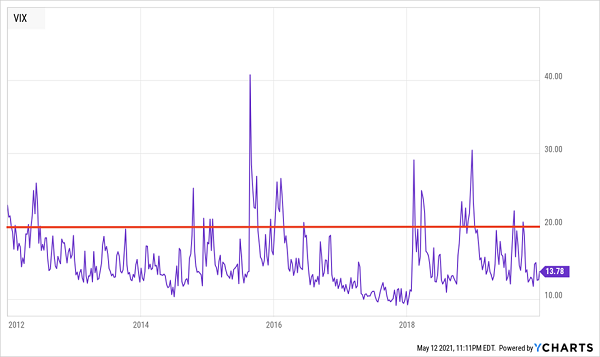
As you can see, the VIX has mostly stayed under 20, spiking just a couple times during periods of crisis (the biggest jump, in late 2015, was when the Federal Reserve started raising interest rates again).
Now let’s look at what’s been happening since the pandemic hit.
How It’s Going
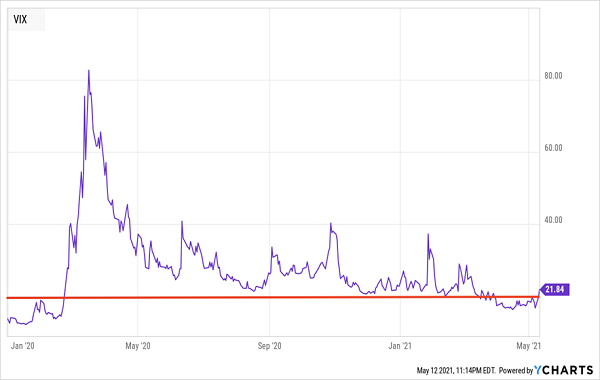
Since early 2020, the VIX has mostly stayed above 20, recently dipping below it due to the successful vaccine rollout in America. But rising fears of inflation in the last few weeks have brought the VIX back above 20. In other words, the fearless markets of the 2010s have become more fearful in the 2020s. This is the core of the opportunity in front of us today.
Our Strategy: Cash in on Volatility With Options
Truth is, even the few investors who’d bother to try to profit from this situation would likely pick the wrong horse. A go-to way to play a volatile market, for example, is something like the iPath® Series B S&P 500® VIX Short-Term Futures™ ETN (NYSE:VXX), an exchange traded note (ETN) that uses options to profit when the VIX rises. It was a winner last year, when the COVID-19 crash hit:
VXX Takes Off in the Short Run …
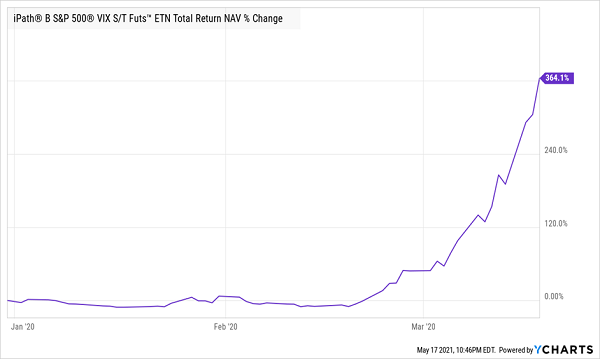
But investing in an ETN takes a quick hand—as you can see, VXX is a loser if you hold it over a period of years.
… But It’s No Place to Invest Your Nest Egg
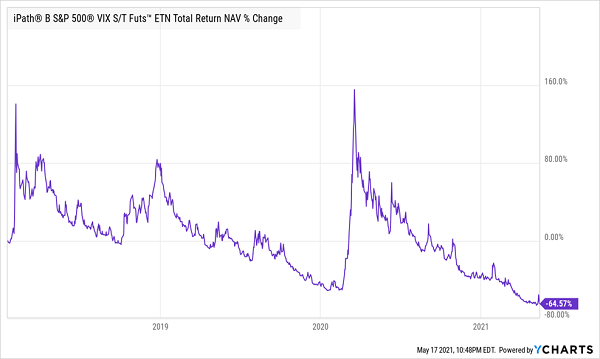
I don’t recommend ETNs for other reasons, not the least of which being that, unlike ETFs (with which they’re often confused), ETNs don’t buy the assets they track. Instead, they’re a debt issued by a financial firm that pays investors the value of the index the ETN follows. Part and parcel to that is a condition that lets the issuer shut down the ETN if its value falls below a certain level. If you’re caught holding it when that happens, you could end up locking in a big loss.
Luckily there’s a safer way to play today’s choppier markets: it’s a group of funds that will give us big dividend payouts, plus we’ll actually own the stocks we buy—I’m talking S&P 500 leaders like Apple (NASDAQ:AAPL), JPMorgan (NYSE:JPM) and Visa (NYSE:V).
Our “Dividends-With-Upside” Answer to Volatility
Our best plays here are “covered call” closed-end fund (CEFs) such as the Nuveen S&P 500 Dynamic Overwrite Fund (NYSE:SPXX), which yields a hefty 5.8% today.
SPXX, one of the better-known covered-call CEFs, generates that outsized income stream with a strategy that profits when volatility picks up: it sells call options, or the right to purchase the stocks in its portfolio at a higher price in the future. The fund collects upfront payments in return for these options, which it then hands to us as dividends.
SPXX Rides Its Option Buys to Low-Drama Gains
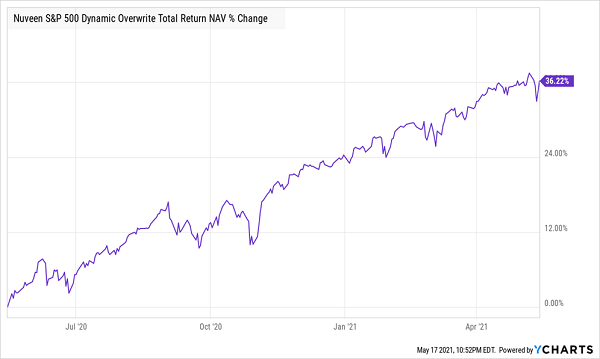
This strategy has a lot going for it: not only is it simple (the fund’s managers manage the options for you and give you the proceeds), but it’s also helped SPXX deliver a steady 36% total return over the last year, far ahead of its 9% annualized return over the last decade.
That’s because the new normal in volatility is boosting the value of the call options SPXX sells, thus securing the fund’s higher income stream while increasing its net asset value (NAV, or the overall value of the stocks it holds).
While it’s true that SPXX has underperformed the S&P 500 in the past year, the new floor in volatility is likely to change that for the foreseeable future. This is why covered-call funds like SPXX are smart buys in these uncertain days.
5 More Funds That Thrive a Volatile Market (and Yield 7.3%)
Let’s go one better with a set of 5 other CEFs that yield even more than SPXX—a 7.3% average payout, to be precise. And these funds are just as well-positioned to profit from volatility due to their outsized discounts: they’re so cheap now that I’m calling for 20%+ price gains in the next 12 months!
And if markets happen to drop from here, their cheap valuations will insulate their share prices—and you’ll collect their rich 7.3% payouts either way!
Disclosure: Brett Owens and Michael Foster are contrarian income investors who look for undervalued stocks/funds across the U.S. markets. Click here to learn how to profit from their strategies in the latest report, "7 Great Dividend Growth Stocks for a Secure Retirement."
